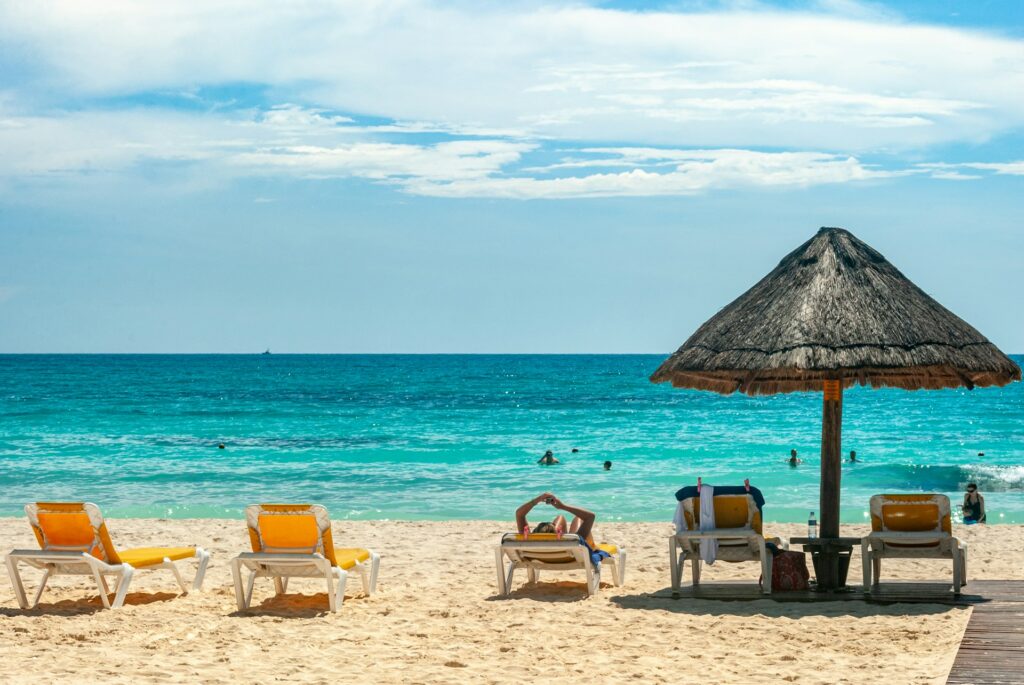
(Cupventi.com) – In a significant crackdown on drug-related violence that has shocked the popular tourist destination of Cancun, Mexican law enforcement agencies have made a series of arrests linked to a spate of brutal killings. The operations have cast a spotlight on the dark underbelly of crime that threatens the area’s bustling tourism sector.
In a distressing incident that underscores the severity of the situation, authorities disclosed the capture of six individuals affiliated with a drug cartel, implicated in the merciless killing of at least eight people. This announcement followed the gruesome discovery of five dismembered bodies concealed within a taxi on January 29, a grim indicator of the ferocity of the drug trade’s internal conflicts. The identities of the deceased remain undisclosed, adding a layer of mystery and tragedy to the already heinous act.
The arrested suspects are accused of barbarically mutilating five victims with a machete, a method of violence that speaks to the brutal tactics employed by drug gangs to instill fear and maintain control. Additionally, three other individuals were found buried in a shallow grave, a chilling testament to the cartel’s disregard for human life. During the arrests, law enforcement officials confiscated an array of illegal substances, including marijuana, cocaine, and crack, along with military-grade firearms, motorcycles believed to be used for transporting the victims’ bodies, and vehicles, one of which was reported stolen. This cache of items provides a glimpse into the operational tools and methods used by these gangs to conduct their illicit activities.
In a related development, the Attorney General’s Office revealed the arrest of 23 individuals operating under the guise of a tour agency in Cancun, which allegedly served as a front for their drug trafficking operations. This so-called “call center” promoted tourist excursions and sports equipment rentals as a facade for their real business: drug dealing. This ingenious but nefarious scheme involved taking orders over the phone and delivering drugs via motorcycle, highlighting the sophisticated methods drug rings employ to disguise their activities within the tourism industry.
The violence attributed to drug cartels in the region is not isolated to Cancun. In the nearby resort city of Tulum, a tragic incident occurred on February 9, where an American woman and a Belizean man were fatally shot at a beach club, victims of what appears to be a dispute between drug dealers. The woman, tragically, was an innocent bystander, caught in the deadly crossfire. Authorities found the male victim in possession of drugs, further linking the murder to drug trafficking disputes. The search for suspects in this case is ongoing, underscoring the persistent challenge authorities face in combating drug-related violence.
This wave of violence and the associated risks to tourists have prompted Mexican authorities to take action beyond arrests. Following warnings about the sale of counterfeit drugs to foreigners, including dangerous substances like fentanyl disguised as prescription opioids, a major operation led to the closure of 23 pharmacies in tourist hotspots such as Cancun, Playa del Carmen, and Tulum. These efforts reflect a broader crackdown on the illegal drug trade and its infiltration into the tourist economy.
Despite these challenges, Mexico’s tourism sector, particularly along the Caribbean coast, continues to thrive. The allure of its beaches, cultural offerings, and hospitality has not waned, with foreign tourist expenditures in Mexico rising by 10% in 2023, reaching almost $31 billion. Cancun remains a prime destination, drawing nearly half of all international visitors to Mexico. However, the U.S. State Department has issued travel alerts, advising increased caution, especially after dark, in light of the ongoing threats posed by drug cartel violence.
The juxtaposition of Mexico’s vibrant tourism industry with the sinister drug war underscores a complex challenge: maintaining the country’s status as a top travel destination while ensuring the safety of both its citizens and visitors. The recent arrests and crackdowns reflect a determined effort by Mexican authorities to combat the drug cartels’ influence and restore peace to its cherished tourist regions. Yet, as these developments reveal, the road to achieving this goal is fraught with difficulties, demanding constant vigilance and cooperation among law enforcement, the tourism industry, and the international community.